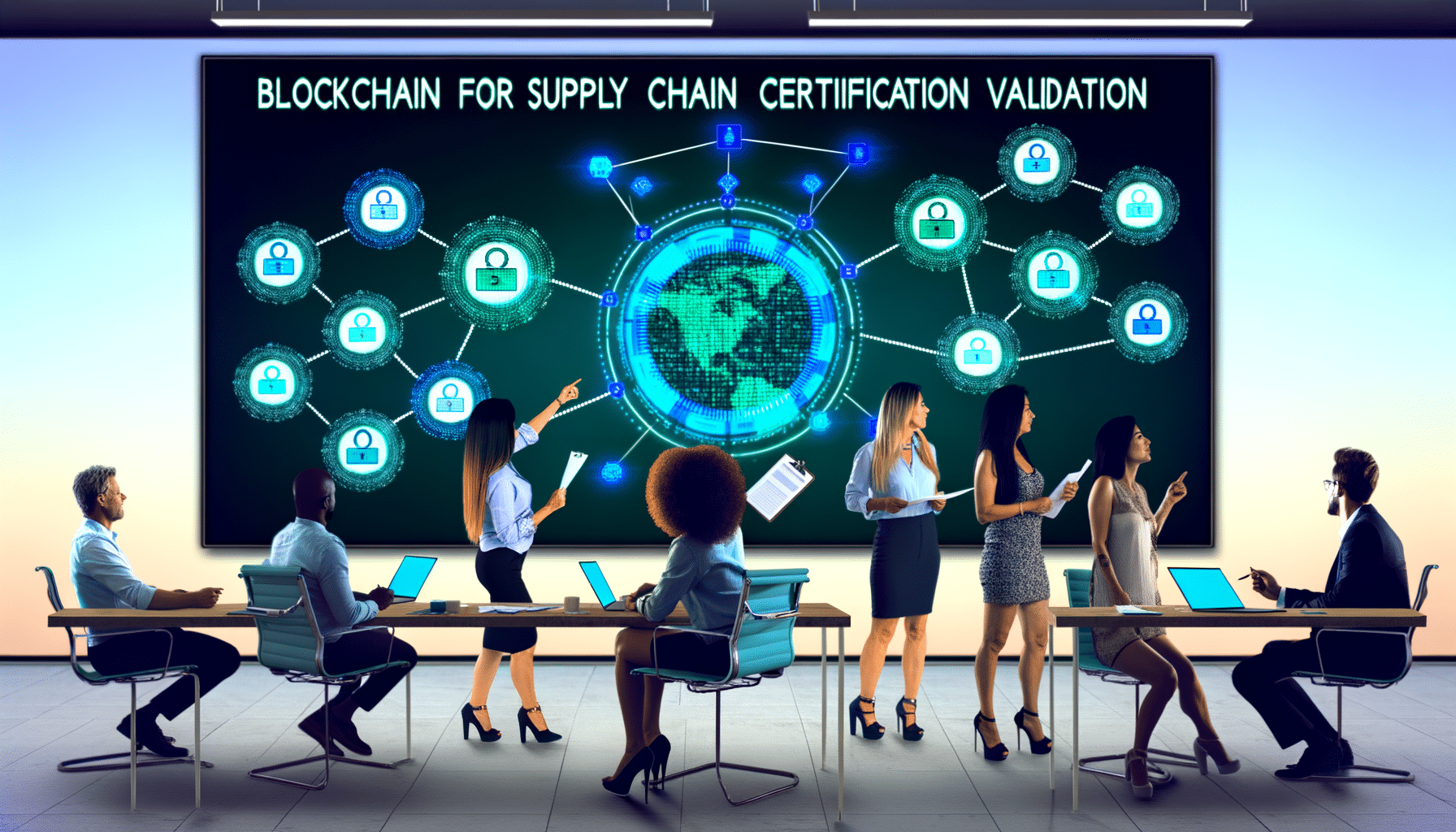- Logistics
- November 16, 2024
Blockchain for Supply Chain Certification Validation

Revolutionizing Supply Chain Certification Validation with Blockchain
As someone deeply invested in technology and its potential to reshape traditional sectors, I’ve always been fascinated by the ways blockchain is revolutionizing industries beyond its cryptocurrency roots. One of the most promising applications lies in the realm of supply chain certification validation. In this blog post, I aim to shed light on how we can use blockchain to ensure the integrity and transparency of supply chain certifications—an essential component in maintaining trust, compliance, and efficiency in logistics.
Understanding the Certification Challenge in Supply Chains
In today’s global market, the demand for certification across supply chains is more pressing than ever. Certifications serve as a testament to compliance with safety, environmental, and ethical standards. Whether it’s verifying organic produce or ensuring fair trade practices, these credentials underpin consumer trust and brand reputation.
However, the traditional methods of certification validation are fraught with challenges. Manual processes are time-consuming and prone to human error. Moreover, fragmented systems can lead to opaque operations, fostering an environment where fraudulent certifications can slip through the cracks. This is where blockchain technology can play a transformative role.
How Blockchain Enhances Certification Validation
Blockchain, at its core, offers a decentralized and immutable ledger that ensures data integrity. Let’s explore how this technology can tackle the challenges inherent in supply chain certification:
- Transparency: Blockchain provides a transparent view of the entire supply chain, from origin to endpoint. Every stakeholder, be it a producer or regulator, can access a shared view of the certification status, creating a system where no single entity can alter the records without consensus.
- Authentication: Digital certificates stored on the blockchain are cryptographically verified, eliminating the risk of forgery. This ensures that stakeholders can trust the validity of certifications, as any attempt to modify them is easily identifiable.
- Efficiency: Automated smart contracts streamline the certification process, enabling instantaneous validation checks and reducing the need for labor-intensive manual audits.
Making the Case: Blockchain in Action
To illustrate the potential of blockchain in supply chain certification, let’s consider a real-world application. In the food industry, ensuring compliance with organic certification standards is crucial. By using blockchain, every step—from the farm where produce is grown to the store where it’s sold—is recorded with precision. This guarantees that end consumers are genuinely receiving what the label promises.
Moreover, companies like Everledger are already leveraging blockchain to authenticate diamond origins, eliminating conflict diamonds from the market. By securely tracking each diamond’s journey through the supply chain, they’re ensuring ethical procurement practices are followed and verified.
Challenges and Considerations
While the benefits of blockchain for supply chain certification are clear, it’s essential to acknowledge potential hurdles. Implementing blockchain requires upfront investment in technology and training. Additionally, collaboration across industry players is crucial for the establishment of standardized protocols and the smooth exchange of information.
It’s also worth noting that blockchain isn’t a one-size-fits-all solution. The decision to integrate it into supply chain operations should be driven by a thorough analysis of context-specific needs and potential returns on investment.
Conclusion: The Path Forward
Blockchain technology stands as a pillar of innovation in the quest for more transparent, efficient, and reliable supply chains. By offering a robust framework for certification validation, blockchain not only addresses existing challenges but also paves the way for enhanced compliance, consumer trust, and operational efficiency.
In my journey as the founder of RecordsKeeper.AI, I am excited to foster conversations around technology integration in traditional sectors, providing solutions that not only meet today’s demands but also anticipate future needs. I invite you to follow my journey, explore these technologies further, and imagine a world where supply chains function with unprecedented transparency and trust.
Toshendra Sharma is the visionary founder and CEO of RecordsKeeper.AI, spearheading the fusion of AI and blockchain to redefine enterprise record management. With a groundbreaking approach to solving complex business challenges, Toshendra combines deep expertise in blockchain and artificial intelligence with an acute understanding of enterprise compliance and security needs.
Related Posts

Blockchain for Real-Time Supply Chain Compliance
Enabling real-time compliance monitoring in supply chains using blockchain.
- November 16, 2024

Blockchain-Based Supply Chain Records
Enhancing transparency in supply chain management through blockchain.
- November 16, 2024
Archives
- January 2025
- December 2024
- November 2024
- October 2024
- September 2024
- August 2024
- July 2024
- June 2024
- May 2024
- April 2024
- March 2024
- February 2024
- January 2024
- December 2023
- November 2023
- October 2023
- September 2023
- August 2023
- July 2023
- June 2023
- May 2023
- April 2023
- March 2023
- February 2023
- January 2023
- December 2022
- November 2022
- October 2022
- September 2022
Want to get more content like this?
Signup to directly get this type of content to your inbox!!
Latest Post
Document Control for Equipment Maintenance
- January 20, 2025
Managing Records for Multiple Clients
- January 19, 2025
Handling Conference Documentation
- January 18, 2025
Setting Up Department Record Reviews
- January 17, 2025





